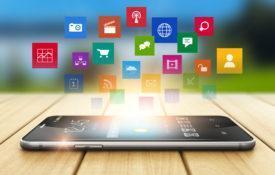-

Is Your Identity a Concern? Smartphone App Usage Alone May Give It Away
The amount of time you spend each day using different smartphone apps may be enough to reveal your identity, according to new research published in the journal Psychological Science.
-
Losing Your Keys Doesn’t Mean You’re Losing Your Mind. Here’s How to Find Your Stuff.
Sasha Bradford doesn’t have time to lose things. She’s a working mom with lots of hobbies, and when she misplaces her keys or important papers — or leaves a favorite purse at a restaurant — she becomes frustrated and irritable. “It impacts me greatly,” said Bradford, 34, a D.C.-based federal contracting officer who blogs about mental health. Bradford has attention-deficit/hyperactivity disorder, which makes her “prone to put things places and not remember where I put them,” she said. She’s learned to adapt, in part by writing down where she has stored valuables, such as expensive jewelry, and setting micro goals. For example, “every time I travel, I typically forget or lose something.
-
Can Single People ‘Manifest’ a New Partner?
Just over a month before Jocelyn Woods and Mia Garcia met, they sat down independently and listed the qualities that each was seeking in a partner. “From how they cooked to the interactions they would have with their family, I was extremely specific,” said Ms. Woods, a 23-year-old director who lives in Los Angeles. Later, the pair would meet at a friend’s birthday party, feel “immediately like best friends” (according to Ms. Garcia, a 21-year-old musician who also lives in Los Angeles) and then, four weeks into dating, show each other these pages. Had they somehow manifested their relationship?
-
A Plea for Better Working Conditions for Young Scientists
It’s been a while since I took the lead on writing one of these columns. The last time I did so was in June 2020, when I wrote about my experiences as a Black scientist. I have been relatively quiet since then not because I haven’t wanted to share advice with our readers, but because lately I just really don’t know what to say to young scientists that would be helpful. When we started this column 4 years ago, I had just started my faculty position and I agreed to join the team because I believed in the theory of change that inspired the column’s creation.
-
If You’re Finding This Stage of the Pandemic Especially Confusing, You’re Not Alone
The omicron surge is declining fast in the U.S. One state after another is lifting their mask mandates. But more than 175,000 people are still catching the virus, and more than 2,200 people are still dying from COVID-19, every day. And federal officials say it's too soon to loosen restrictions. Is your head spinning? Are you feeling anxious? It's not surprising, according to psychologists, sociologists and medical anthropologists. "It's very confusing," says Ayelet Fishbach, a professor of behavioral science at the University of Chicago.
-
I Gave Myself Three Months to Change My Personality
One morning last summer, I woke up and announced, to no one in particular: “I choose to be happy today!” Next I journaled about the things I was grateful for and tried to think more positively about my enemies and myself. When someone later criticized me on Twitter, I suppressed my rage and tried to sympathize with my hater. Then, to loosen up and expand my social skills, I headed to an improv class. I was midway through an experiment—sample size: 1—to see whether I could change my personality. Because these activities were supposed to make me happier, I approached them with the desperate hope of a supplicant kneeling at a shrine.

